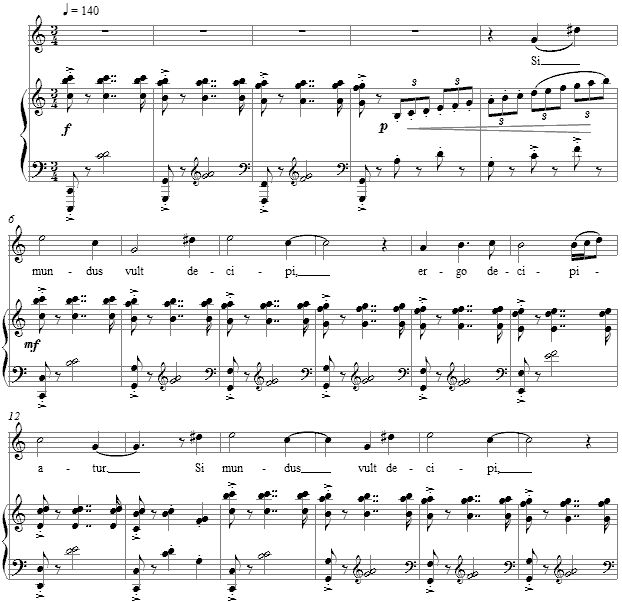Music and Texts of GARY BACHLUND
Vocal Music | Piano | Organ | Chamber Music | Orchestral | Articles and Commentary | Poems and Stories | Miscellany | FAQs
Si mundus vult decipi - (2008)
text of the composer, after a Latin proverb
for high voice and piano
Quidquid latine dictum sit, altum viditur
Si mundus vult decipi,
ergo decipiatur.
If the world wants to be deceived,
so let it be deceived.
Fools seek to be believed,
for so they plead.
Hooray for the fools!
Worldly fools!
The world's filled with fools!
Si mundus vult decipi,
ergo decipiatur.
Tomfoolery, buffoonery,
stupidity, absurdity.
There's balderdash and Eurotrash,
and senselessness with cheap finesse,
as art is in a worldly mess!
Oh, distress!
Si mundus vult decipi,
ergo decipiatur.
Deceived![ 4 pages. circa 2' 00" ]
Si mundus vult decipi, ergo decipiatur
The adage is ascribed to Petronius, a Roman satirist from the first century, AD. The proverb is also attributed to a pontifex maximus Scævola, though several carry this title and name. All were politicians of the Roman Republic and an early authorities on Roman law; the pontifex -- or highest of the pagan priestly class -- thought it expedient that people should be deceived "in religion." One asserted many truths, which it is useless for the "vulgar to know; and many falsities which it is fit the people should not suppose are falsities." Therefore the proverb speaks to the same notion of which American president Abraham Lincoln so famously observed, "You may fool all the people some of the time, you can even fool some of the people all of the time, but you cannot fool all of the people all the time.” Fooling some of the people seems to prove useful to many professions, among them, academics, politics and the modern European opera theater.
This adage was sent to me by a colleague with whom I have worked closely who observed that it could be the "motto of modern regisseurs," or theatrical stage directors. From this one comes to the notion of Eurotrash and other forms of pressing the seemingly lunatic fringes of an unstructured avant garde on an unsuspecting and often unappreciative audience. To this topic I devoted an article, How to Opera Germanly, in 2006. That the proverb seemed so apt for our common experiences with some -- but certainly not all -- stage directors deceiving others as to their lackluster but well asserted "brilliance," this little rhyme popped into my thoughts and a song setting quickly thereafter. And so the these nameless which we all might know is this song setting dedicated.
As with much of the common practice classical music, the use of simple scalar materials fed a cornucopia of musical ideas, styles and works. Still not fully mined, the diatonic scale and other chord forms within that tonal world provide the bulk of this setting's accompaniment. Parallel sevenths and octaves assert that this setting is both traditional and modern at the same time, and -- yes -- there is a twisted version of "Chopsticks" as the second section's bridge material.
While the song is dedicated specifically to theatrical regisseurs, the text applies rather to a greater population than only those in the theater. Certainly the adage applied at one time to those who sold indulgences, but in the modern era we still see indulgences being offered within the supposedly enlightened environmental movement, indulgences none the less to profit some at the expense of others. In a similar way, there are shakedowns of those susceptible to feelings of religious, societal, racial and ethnic guilt as to those who think less critically, providing the world with those so well represented by another adage, "A fool and his money are soon parted."
The ancient Roman Varro explains this very contemporary message that "some things are true, some false, which for their own ends they will not have the gullible commonalty take notice of. As well may witness their intolerable covetousness, strange forgeries, fopperies, fooleries, unrighteous subtleties, impostures, illusions, new doctrines, paradoxes, traditions, false miracles, which they have still forged, to enthrall, circumvent and subjugate them, to maintain their own estates. One while by bulls, pardons, indulgencies, and their doctrines of good works, that they be meritorious, hope of heaven, by that means they have so fleeced the commonalty, and spurred on this free superstitious horse, that he runs himself blind, and is an ass to carry burdens." Centuries ago are not but yesterday: they are still today.
The score for Si mundus vult decipi is available as a free PDF download, though any major commercial performance or recording of the work is prohibited without prior arrangement with the composer. Click on the graphic below for this piano-vocal score.

